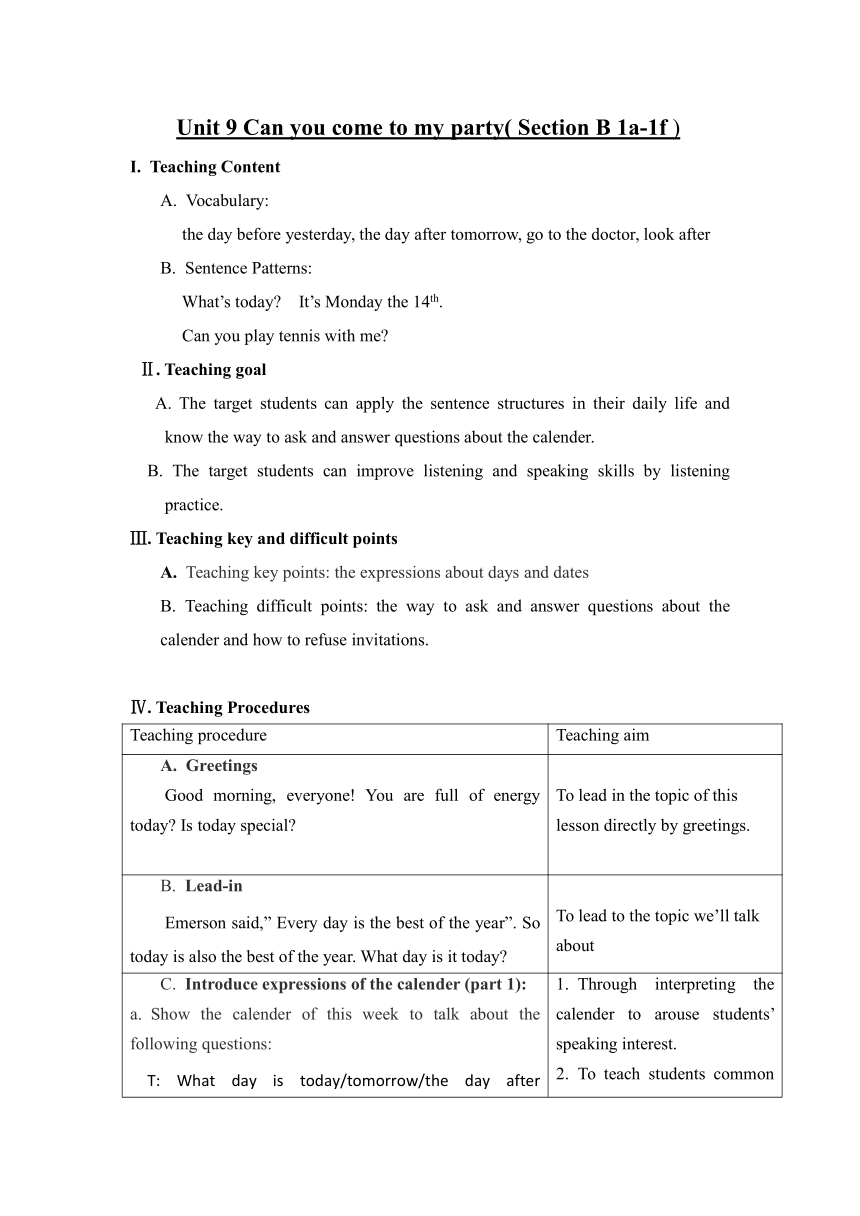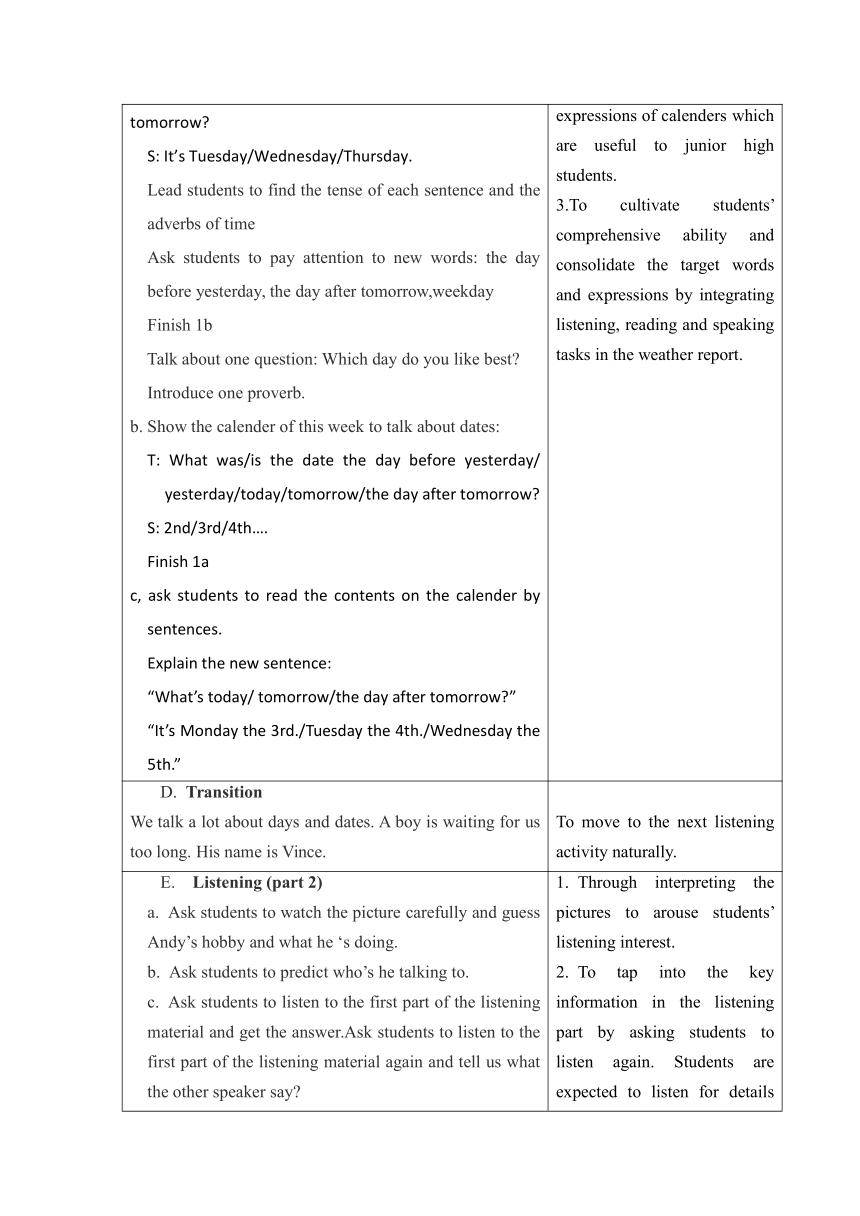人教版八年级上册英语 9.Can you come to my party?SectionB 1a-1f 教案
文档属性
| 名称 | 人教版八年级上册英语 9.Can you come to my party?SectionB 1a-1f 教案 |  | |
| 格式 | doc | ||
| 文件大小 | 43.0KB | ||
| 资源类型 | 教案 | ||
| 版本资源 | 人教新目标(Go for it)版 | ||
| 科目 | 英语 | ||
| 更新时间 | 2022-11-22 21:51:25 | ||
图片预览


文档简介
Unit 9 Can you come to my party( Section B 1a-1f )
I. Teaching Content
A. Vocabulary:
the day before yesterday, the day after tomorrow, go to the doctor, look after
B. Sentence Patterns:
What’s today It’s Monday the 14th.
Can you play tennis with me
Ⅱ. Teaching goal
A. The target students can apply the sentence structures in their daily life and know the way to ask and answer questions about the calender.
B. The target students can improve listening and speaking skills by listening practice.
Ⅲ. Teaching key and difficult points
A. Teaching key points: the expressions about days and dates
B. Teaching difficult points: the way to ask and answer questions about the calender and how to refuse invitations.
Ⅳ. Teaching Procedures
Teaching procedure Teaching aim
GreetingsGood morning, everyone! You are full of energy today Is today special To lead in the topic of this lesson directly by greetings.
Lead-inEmerson said,” Every day is the best of the year”. So today is also the best of the year. What day is it today To lead to the topic we’ll talk about
Introduce expressions of the calender (part 1):Show the calender of this week to talk about the following questions: T: What day is today/tomorrow/the day after tomorrow S: It’s Tuesday/Wednesday/Thursday. Lead students to find the tense of each sentence and the adverbs of timeAsk students to pay attention to new words: the day before yesterday, the day after tomorrow,weekday Finish 1b Talk about one question: Which day do you like best Introduce one proverb.b. Show the calender of this week to talk about dates: T: What was/is the date the day before yesterday/ yesterday/today/tomorrow/the day after tomorrow S: 2nd/3rd/4th…. Finish 1ac, ask students to read the contents on the calender by sentences. Explain the new sentence: “What’s today/ tomorrow/the day after tomorrow ” “It’s Monday the 3rd./Tuesday the 4th./Wednesday the 5th.” Through interpreting the calender to arouse students’ speaking interest.To teach students common expressions of calenders which are useful to junior high students.3.To cultivate students’ comprehensive ability and consolidate the target words and expressions by integrating listening, reading and speaking tasks in the weather report.
TransitionWe talk a lot about days and dates. A boy is waiting for us too long. His name is Vince. To move to the next listening activity naturally.
E. Listening (part 2)Ask students to watch the picture carefully and guess Andy’s hobby and what he ‘s doing.Ask students to predict who’s he talking to.Ask students to listen to the first part of the listening material and get the answer.Ask students to listen to the first part of the listening material again and tell us what the other speaker say Ask students listen to the rest of the listening material and finish 1d.Why can’t he play tennis with Andy?Use the question to lead to Vince’s activities in the chart in 1d. Ask students to know about the activities and prepare for the next listening task.Ask students to listen to the tape gain and finish 1e.Discuss why Andy ask Vince to play tennis. Find the answer from Andy’s diary and introduce an idiom:The greater the hope, the greater the disappointment.Free reading: Ask students to help Andy finish the diary to emphasis new words in this part. And lead another question: What will Andy do next Through interpreting the pictures to arouse students’ listening interest.To tap into the key information in the listening part by asking students to listen again. Students are expected to listen for details including activities and time.To instill logical thinking ability in students by finding answers for the time.To test students’ output by finishing the information in the diary.
Affect. Show a telephone call from Andy to teachers and ask students to work in groups and discuss the following questions: Can you pay tennis with Andy after school If not, why can’t you play tennis with them?Ask some students to share their ideas with us. Conclude the class: If we have time, we’d better do some exercise to keep fit. Today is here, and you use it well. Try our best in class, and every day is the best of the year. Through asking open-ended questions to mobilize students’ enthusiasm and enable students to talk freely using the target words and expressions. Through communication, students are able to know their classmates better and establish their value towards health. And if we try our best , we are the best today.
Ⅴ. Teaching reflection
The highlight of this lesson is the calender part which can help students understand and use target expressions easily. Another creative point is the question chain in the listening part. Besides, the call from Andy makes a person in the book go into our life,which is so fresh to students. Most importantly, the class gives students enough room to speak , think and create their own expressions, which is really important for students to improve their skills in English learning.
This lesson is logically planned with the guidance of the teaching aims, yet there are still some demerits to be improved.
I. Teaching Content
A. Vocabulary:
the day before yesterday, the day after tomorrow, go to the doctor, look after
B. Sentence Patterns:
What’s today It’s Monday the 14th.
Can you play tennis with me
Ⅱ. Teaching goal
A. The target students can apply the sentence structures in their daily life and know the way to ask and answer questions about the calender.
B. The target students can improve listening and speaking skills by listening practice.
Ⅲ. Teaching key and difficult points
A. Teaching key points: the expressions about days and dates
B. Teaching difficult points: the way to ask and answer questions about the calender and how to refuse invitations.
Ⅳ. Teaching Procedures
Teaching procedure Teaching aim
GreetingsGood morning, everyone! You are full of energy today Is today special To lead in the topic of this lesson directly by greetings.
Lead-inEmerson said,” Every day is the best of the year”. So today is also the best of the year. What day is it today To lead to the topic we’ll talk about
Introduce expressions of the calender (part 1):Show the calender of this week to talk about the following questions: T: What day is today/tomorrow/the day after tomorrow S: It’s Tuesday/Wednesday/Thursday. Lead students to find the tense of each sentence and the adverbs of timeAsk students to pay attention to new words: the day before yesterday, the day after tomorrow,weekday Finish 1b Talk about one question: Which day do you like best Introduce one proverb.b. Show the calender of this week to talk about dates: T: What was/is the date the day before yesterday/ yesterday/today/tomorrow/the day after tomorrow S: 2nd/3rd/4th…. Finish 1ac, ask students to read the contents on the calender by sentences. Explain the new sentence: “What’s today/ tomorrow/the day after tomorrow ” “It’s Monday the 3rd./Tuesday the 4th./Wednesday the 5th.” Through interpreting the calender to arouse students’ speaking interest.To teach students common expressions of calenders which are useful to junior high students.3.To cultivate students’ comprehensive ability and consolidate the target words and expressions by integrating listening, reading and speaking tasks in the weather report.
TransitionWe talk a lot about days and dates. A boy is waiting for us too long. His name is Vince. To move to the next listening activity naturally.
E. Listening (part 2)Ask students to watch the picture carefully and guess Andy’s hobby and what he ‘s doing.Ask students to predict who’s he talking to.Ask students to listen to the first part of the listening material and get the answer.Ask students to listen to the first part of the listening material again and tell us what the other speaker say Ask students listen to the rest of the listening material and finish 1d.Why can’t he play tennis with Andy?Use the question to lead to Vince’s activities in the chart in 1d. Ask students to know about the activities and prepare for the next listening task.Ask students to listen to the tape gain and finish 1e.Discuss why Andy ask Vince to play tennis. Find the answer from Andy’s diary and introduce an idiom:The greater the hope, the greater the disappointment.Free reading: Ask students to help Andy finish the diary to emphasis new words in this part. And lead another question: What will Andy do next Through interpreting the pictures to arouse students’ listening interest.To tap into the key information in the listening part by asking students to listen again. Students are expected to listen for details including activities and time.To instill logical thinking ability in students by finding answers for the time.To test students’ output by finishing the information in the diary.
Affect. Show a telephone call from Andy to teachers and ask students to work in groups and discuss the following questions: Can you pay tennis with Andy after school If not, why can’t you play tennis with them?Ask some students to share their ideas with us. Conclude the class: If we have time, we’d better do some exercise to keep fit. Today is here, and you use it well. Try our best in class, and every day is the best of the year. Through asking open-ended questions to mobilize students’ enthusiasm and enable students to talk freely using the target words and expressions. Through communication, students are able to know their classmates better and establish their value towards health. And if we try our best , we are the best today.
Ⅴ. Teaching reflection
The highlight of this lesson is the calender part which can help students understand and use target expressions easily. Another creative point is the question chain in the listening part. Besides, the call from Andy makes a person in the book go into our life,which is so fresh to students. Most importantly, the class gives students enough room to speak , think and create their own expressions, which is really important for students to improve their skills in English learning.
This lesson is logically planned with the guidance of the teaching aims, yet there are still some demerits to be improved.
同课章节目录
- Unit 1 Where did you go on vacation?
- Section A
- Section B
- Unit 2 How often do you exercise?
- Section A
- Section B
- Unit 3 I'm more outgoing than my sister.
- Section A
- Section B
- Unit 4 What's the best movie theater?
- Section A
- Section B
- Unit 5 Do you want to watch a game show?
- Section A
- Section B
- Unit 6 I'm going to study computer science.
- Section A
- Section B
- Unit 7 Will people have robots?
- Section A
- Section B
- Unit 8 How do you make a banana milk shake?
- Section A
- Section B
- Unit 9 Can you come to my party?
- Section A
- Section B
- Unit 10 If you go to the party, you'll have a grea
- Section A
- Section B
